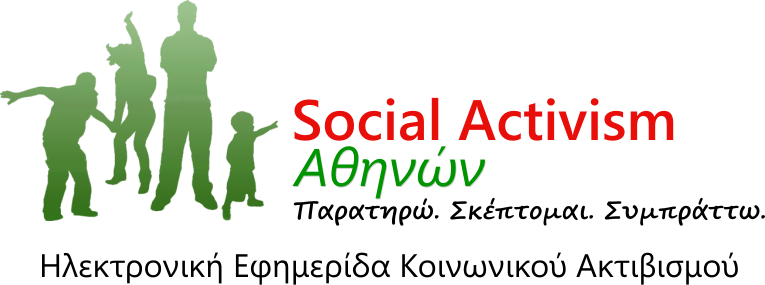Publication;SocialActivism.gr of Athens
Edited by Katerina Nakou
Info from Feantsa.org, City of Athens, Kathimerini

“I do not want to cry in front of you. But I need help. This is the cry of despair of someone that would be ready to commit a crime in order to spend a night in jail or at the hospital so to protect himself from the Athenian cold .
Eleven thousand Greeks, foreigners, men and women, economically ruined from loans and cards, redundant just before retirement, substance abusers, ex-convicts, outcasts, neighbours who used to live a normal life, live like shadows making their homes from cardboard boxes, wood and plastic.
According to research, Greece is placed among the E.U. countries with very high owner occupancy rates with a significant number of households who live in poor housing conditions included. Compared to other European Member States, homelessness in Greece has only recently been understood to be a social problem, mostly by NGOs. Homelessness, however, has clearly escalated in the last few years, to a great extent, due to the influx of a large number of immigrants from neighbouring countries (Eastern Europe).
Traditionally, accommodation problems in Greece have been handled within families. The family – rather than any form of state provision – constitutes the main safety net against homelessness in Greek society to this day. Nonetheless, familistic, religious, and nationalistic values of both social and state actors serve the concealment of homelessness. Social housing provision is minimal and does not even target homeless people. The growing awareness and concern about homelessness in recent years has however led to the creation of various methods to address homelessness, including a limited number of specialised services.
There is severe lack of reliable official data on housing and homelessness in Greece. Research data suggest that the number of street homeless people and those in transitory shelters in the city of Athens is approximately 11,000 (3,000 Greeks and 8,000 foreigners).
City Actions
The basic aim of the programmes planned and implemented by the City of Athens Homeless Foundation is to tackle problems faced by humans who, for whatever reason, are without shelter or whose home is unsafe and inadequate. In carrying out its mission, the Homeless Foundation works together with agencies which share the same goals. Beyond the other services it offers, the Foundation collects and distributes food items, clothing, shoes etc to those who visit or are hosted at the shelter, as well as families and individuals located by its staff, other social services, parishes, volunteers and collaborating agencies.
KYADA provides 1,200 meals to destitute and homeless Greeks and foreign nationals on a daily basis. Meals are served twice a day (midday 12:00-13:00 and afternoon 18:00-19:00) at the Foundation’s Meal Provision Centre, located at the junction of 70 Sofokleous and 35 Pireos streets.
KYADA operates two hostels where it offers short-term accommodation (3-6 months) to 180 persons aged 18-65 years of age. Hostel services are free of charge and the same for all guests.
In its effort to raise awareness and promote citizen participation, the Homeless Foundation is focusing on the realization of specific actions. Initially, it is establishing cooperation with agencies which have similar organizational goals, such as the Church of Greece, the Hellenic Red Cross (EES), non-governmental organizations and the Athens Chamber of Commerce and Industry (ACCI).
Additionally, the Society of Friends of the Homeless Foundation is assisting in the formation of a volunteer network. A wide range of activities is carried out as part of a crisis management plan and street help services.
Finally, special advertising campaigns and a series of events are organized in an effort to fully inform citizens and meet the needs of the homeless
